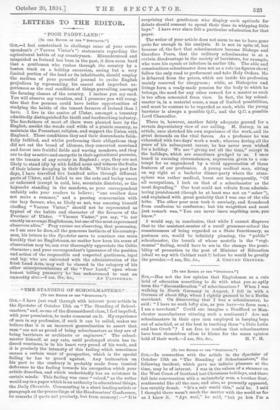"THE STANDING OF SCHOOLMASTERS."
[TO THE EDITOR OF THE a ETECTATOR,,n] 4:311I,—I have just read through with interest your article in the Spectator of October 13th on " The Standing of School- masters," and, as one of the disconsidered class, I feel impelled, with your permission, to make comment on it. My experience -of men in my profession, if such it can be called, makes me believe that it is an incorrect generalisation to assert that. men "are not as proud of being schoolmasters as they are of being barristers or architects or engineers." The school- master himself, at any rate, until prolonged strain has in- duced weariness, is in his heart very proud of his work, and it is precisely the intensity of this feeling which sometimes causes a certain want of perspective, which is the special failing he has to guard against. Any insinuation on his part to the contrary is probably made from ironical -deference to the feeling towards his occupation which your article describes, and which undoubtedly has an existence in -certain minds. This feeling was once "voiced," as the writer would say in a paper which is an authority in educational things, the Daily Chronicle. Commenting in a short leading article or paragraph on the proceedings of the Headmasters' Conference, he remarks (I quote not precisely, but from memory) :—" It is
surprising that gentlemen who display such aptitude for debate should consent to spend their time in whipping little boys." I have ever since felt a particular admiration for that paper.
The writer of your article does not seem to me to have gone quite far enough in his analysis. It is not in spite of, but because of, the fact that schoolmasters become Bishops and therefore Peers, that the ordinary schoolmaster is at a certain disadvantage in the society of barristers, for example, who were his equals or inferiors in earlier life. The able and conscientious schoolmaster does not as a rule (as figures show) follow the only road to preferment and take Holy Orders. He is debarred from the prizes, which are inside his profession mainly reserved for clergymen ; while, as Bishoprics and livings form a ready-made pension for the body to which he belongs, the need for any other reward for a master as such is too often concealed from view. In fact, the lay school- master is, in a material sense, a man of limited possibilities, and must be content to be regarded as such, while the young barrister is always a possible Q.0., and the Q.C. a possible Lord Chancellor.
There is, however, another fairly adequate ground for a certain depreciatory view of our calling. M. Sarcey, in an article, once sketched his own experience of the work, and its great demands on the vital forces. As a professor he was exhausted with two days' work a week ; whereas during all the years of his subsequent career, he has never even wished for a holiday. We are "giving out all the time," except in the holidays, which are sometimes grudged to us. I once heard in amusing circumstances, expression given to a con- tempt for us engendered by a vivid appreciation of these features of our profession. A young medical man, sitting on my right at a bachelor dinner-party where the atmo- sphere was rather medical, burst out inconsequently, "Of all occupations, I look on that of a schoolmaster as the most degrading." Our host could not refrain from adminis- tering panishment (though he at least was not an " usher "),
and explained with great geniality that I was one of the vile tribe. The other poor man took it unwisely, and floundered
from confusion to confusion ; but his weightiest and most just remark was, "You can never learn anything new, you know."
I would say, in conclusion, that while I cannot disprove that to the assistant-master of a small grammar-school the consciousness of being regarded as a State functionary, as postmen are, would be infinitely pleasing, the " public " schoolmaster, the breath of whose nostrils is the "regi- mental" feeling, would have to see in the change the possi- bility of promotion to the post of Minister of Education (shall we say with Cabinet rank ?) before he would be greatly




































 Previous page
Previous page